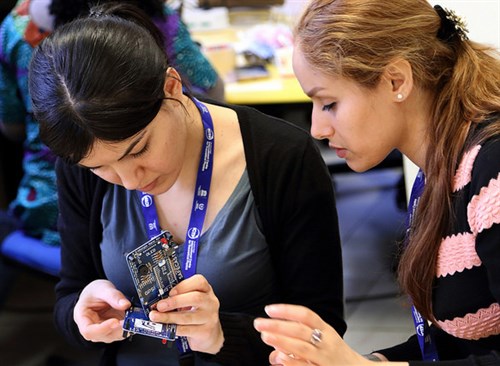I - 34151 Trieste Italy
(+39) 040 2240 111
pio@ictp.it

04/04/2017 - Trieste
Citizen science opens up the exciting world of scientific investigation to the general public. At its basic level, this people-powered research involves the collection of data that is used by professional researchers to analyze everything from the existence of mystery planets to the movements of wild animals in urban settings.
An intensive, three-week workshop organized by ICTP and its UN partner, the International Atomic Energy Agency (IAEA) explored the use of citizen science to promote environmental protection in developing countries. Thirty participants from 25 developing countries attended the event, titled ‘Environmental Mapping: Mobilizing Trust in Measurements and Engaging Scientific Citizenry’. Safecast, an international network of citizen scientists, co-sponsored the activity and inspired much of its content, which ranged from hands-on instruction for building radiation detectors to data visualization and stakeholder engagement.
Safecast has been on the forefront of citizen science since the organization’s birth shortly after Japan’s Fukushima disaster in 2011. Its volunteer members banded together to fill a data gap about radiation levels generated by the crippled Fukushima Daiichi nuclear power plant. “One of the biggest problems faced by the people of Fukushima after the accident was the anxiety and uncertainty,” says Joe Moross, a Tokyo-based radiation and environmental sensor engineer and Safecast volunteer. “We tried to alleviate this by giving people the tools to be more aware of the problem and providing solutions that could make them the protagonists of concrete actions,” he explains.
One such tool is Safecast’s bGeigie, a mobile, GPS-enabled radiation detector about the size of a Japanese bento lunch box. The low-cost device is open source, meaning anyone can access the free blueprints to build one (indeed, Safecast encourages users to “hack” the device as a path to improvement). The data collected by the thousands of volunteers who have built and used the devices is free and open for anyone to use.
The affordable device made it the perfect tool to construct at the recent ICTP workshop. “The detector is low cost technology, and is self-assembled, which means it is self maintainable,” explains Iain Darby, a co-organizer of the activity and head of the IAEA’s Nuclear Science and Instrumentation Laboratory. “And because the workshop participants are mostly from universities, they can return to their home countries and train others there. The more people you train, the better informed the world is,” adds Darby. Each year, ICTP and the IAEA organize nearly a dozen events on nuclear topics for developing-world scientists, furthering the Agency’s “Atoms for Peace and Development” mission.
According to Azby Brown, Safecast’s lead researcher, developing countries have the biggest need for citizen science. “Some of the first applications were sensors for dairy farmers in India or water quality testing for people in remote regions. The tools we are using put low-cost devices in people’s hands. We think empowering citizens is important to strengthen civil society,” says Brown.
Rapid advances in technology have further nurtured citizen science, with a positive follow-on effect for the professional researchers analyzing the data. “With the advent of smartphones and low cost electronic sensors, citizen science projects have a huge potential to provide scientific data useful for academic research," says Marco Zennaro, a researcher at ICTP’s Wireless Lab and a co- organizer of the workshop. “There are many projects in which citizens have contributed to scientific research, reporting data that would otherwise be difficult, if not impossible, to obtain. With public participation, the number of measurements that can be made is far superior to those gathered with the traditional tools.”
Workshop participants spent the first week building their personal bGeigies. Week two was dedicated to data analysis and visualization, with sessions on open-source software to produce map-based data. The workshop concluded with a week of science communication training and stakeholder engagement. “Being able to communicate scientific results to the general public is a must,” says Zennaro.
All of the workshop’s activities and lectures took place in ICTP’s Scientific Fabrication Laboratory (SciFabLab), a makers’ space with the tools (3D printers, laser cutters, soldering equipment) needed to build and assemble low-cost technologies that can be used in science education. The hands-on aspects of the workshop, combined with lectures by leading experts on issues related to the collection and dissemination of open data, left participants with a well-rounded impression of citizen science potentials.
“Citizen science is important for us in Colombia,” says workshop participant Jesus Pena Rodriguez of the Universidad Industrial de Santander, who is coordinating a project there. “We are using weather stations to introduce young people to the science world in an easy way, to show them that science is interesting and exciting, and that it is open to all,” he explains, adding that he is looking forward to sharing what he has learned with his students.
Safecast’s Moross was impressed by the ingenuity of the workshop participants. “Most of the participants are from regions where technology is more expensive. It is a real challenge for them to build something useful at a low cost. One participant showed us how he had built a drone out of scrap metal that he found lying around! It’s quite impressive to see what innovation and improvisation they are doing.”
The potential impacts of the workshop include the development of transparent, open-science networks throughout the developing world nurturing a rich collection of data for researchers, and a growing body of citizens who have captured the excitement of participatory science exploration. For less advantaged regions of the world, these impacts could ensure that their countries are on track for a sustainable future.
Related links:
Workshop photos on Flickr